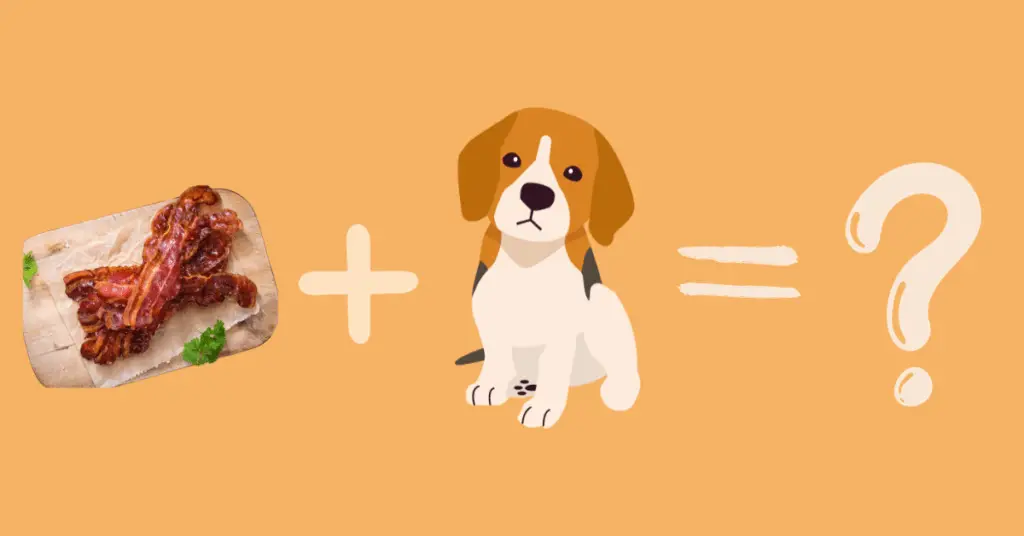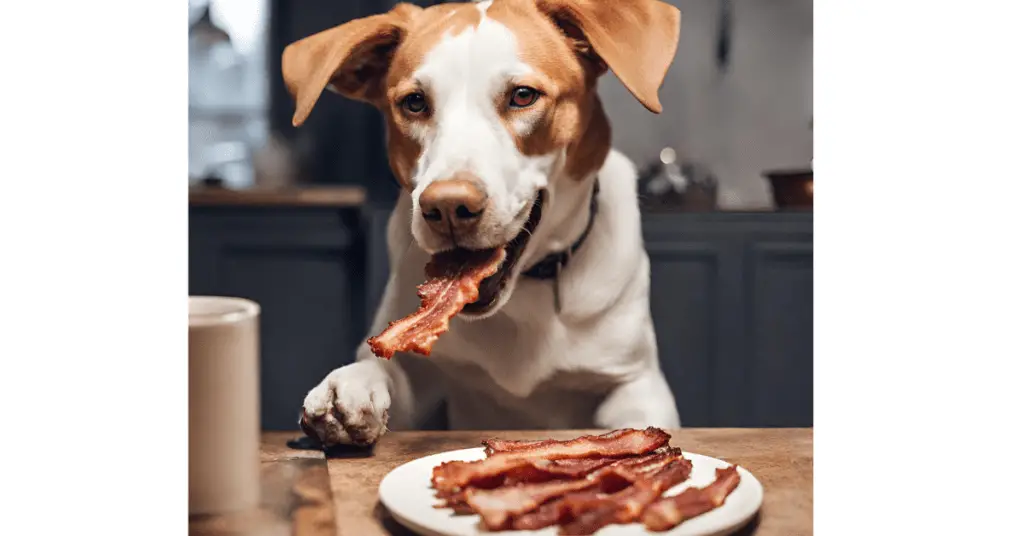
Can dogs eat bacon? This common question among dog owners often arises when they’re sharing breakfast or cooking up some bacon for themselves. While dogs might show a keen interest in bacon, is it safe for them to consume? In this blog, we’ll delve into the world of dogs and bacon, exploring the benefits of bacon for dogs and answering frequently asked questions about this popular treat for our canine companions.
Can dogs eat Bacon?
Yes, dogs can eat bacon, but it should be given in moderation due to its high fat and sodium content. The benefits of bacon for dogs include being a protein source and a tasty training treat. However, excessive consumption can lead to health issues like pancreatitis, so it’s crucial to offer it as an occasional treat.
How Much Bacon Would Be Okay?
Consider the Size: Adjusting portions based on your dog’s size and breed.
When considering giving your dog bacon, moderation is key. Bacon is high in salt and fat, which can be harmful to your dog in excess. For small breeds, even a small amount of bacon can be significant in their daily salt and fat intake. It’s recommended to consult with your veterinarian to determine an appropriate amount of bacon based on your dog’s size, breed, and overall health.
Is Bacon Good for Dogs?
Sodium Sensitivity: Watch out for high sodium content in bacon.
While bacon can offer certain benefits, it’s essential to address potential concerns. One major concern is the high sodium content in bacon. Excessive salt intake can lead to health issues like increased thirst, urination, and in severe cases, sodium ion poisoning. Therefore, it’s vital to choose low-sodium bacon or consider alternatives to mitigate this risk.
Potential Allergies: How to detect if your dog is allergic to bacon.
Moreover, it’s essential to monitor your dog for any signs of allergies or adverse reactions after consuming bacon. Some dogs may have sensitivities to certain proteins, additives, or preservatives present in bacon. If you notice symptoms such as itching, rashes, or digestive issues, it’s best to avoid feeding bacon and consult your vet.
Benefits of Bacon for dogs

Let’s explore the benefits of bacon for dogs, focusing on why it’s considered a treat by many pet owners.
Bacon, a beloved breakfast item for humans, is often equally adored by our canine companions. While it’s crucial to exercise caution and moderation when sharing human food with pets, including bacon, there are potential benefits that come with this savory delight for dogs.
1. Protein Boost:
Bacon is rich in protein, a vital nutrient for dogs. Protein is necessary for the growth, repair, and maintenance of tissues, muscles, and cells. When given in appropriate amounts, bacon can supplement a dog’s protein intake.
2. Tasty Training Treats:
The taste and aroma of bacon make it an enticing treat for dogs, making it an excellent choice for training sessions. Bacon can be broken down into small, manageable pieces, serving as a rewarding incentive for good behavior during training.
3. Healthy Fats:
Bacon contains fats, including omega-3 and omega-6 fatty acids, which are beneficial for a dog’s coat and skin health. These healthy fats contribute to a shiny coat and can aid in managing skin irritations.
4. Administering Medication:
Dogs often dislike taking medication, but wrapping a pill in a small piece of bacon can make it more palatable for them. The enticing taste of bacon can mask the medicine’s flavor, making it easier for your dog to swallow.
5. Appetite Stimulant:
For dogs with a finicky appetite or those recovering from an illness, a touch of bacon aroma can stimulate their interest in food. Adding a hint of bacon to their meals may encourage them to eat, ensuring they receive the necessary nutrients for recovery.
6. Dietary Variety:
Introducing bacon in moderation can add variety to a dog’s diet, preventing mealtime monotony. However, it should not replace their regular dog food but rather complement it.
Is Raw Bacon Good for Dogs?
Addressing the concern of whether dogs can consume raw bacon is crucial for their well-being. Raw meat, including bacon, can pose serious health risks to dogs. Raw meat may contain harmful bacteria like Salmonella or E. coli, which can lead to gastrointestinal issues and discomfort in dogs.
Why Cooked is Preferred: Benefits of cooked bacon for dogs.
Hence, it’s strongly advised to serve bacon only in a thoroughly cooked form. Cooking the bacon removes potential pathogens, making it safer for dogs to ingest.
What I should do if my dog ate Raw bacon?
Monitor Your Dog: Keep a watchful eye on your pup for any signs of unease or discomfort. Common signs of digestive issues might include vomiting, diarrhea, or an upset stomach.
Contact Your Veterinarian: Reach out to your veterinarian immediately and inform them about the situation. They can provide guidance based on your dog’s size, health, and the amount of raw bacon ingested.
Hydration and Rest: Ensure your dog has access to fresh water to stay hydrated. Provide a comfortable and quiet resting place for your dog to recover.
Observe Closely: Continue to observe your dog for the next 24-48 hours. If you notice severe symptoms like lethargy, inability to keep water down, bloody stools, or any signs of distress, contact your veterinarian immediately.
Prevent Future Incidents: To prevent future incidents, store food items securely and out of your dog’s reach. Educate family members or household members about the importance of keeping harmful foods away from pets.
Dog-friendly Bacon recipe
Creating a safe cooked bacon recipe for your furry friend is simple and easy. Here’s a step-by-step guide:
Ingredients:
High-quality lean bacon strips (without seasoning or additives)
Instructions:
- Choose lean, unseasoned bacon strips. Avoid bacon with added flavors, spices, or excessive salt.
- Preheat your oven to 375°F (190°C).
- Lay the bacon strips on a baking sheet, ensuring they don’t overlap. You might want to consider using parchment paper to line the sheet for a breeze when it comes to cleaning up.
- Place the baking sheet in the preheated oven and bake for about 15-20 minutes, or until the bacon is crispy. Keep an eye on it to prevent overcooking.
- Once baked, let the bacon strips cool on a paper towel to remove excess grease. Dab the bacon gently to absorb any remaining oil.
- Cut the cooked bacon into small, dog-friendly pieces. Ensure they are an appropriate size for your dog, considering their breed and chewing ability.
- Serve the cooked bacon pieces to your dog as an occasional treat. Always bear in mind, keeping a balanced diet for your furry friend is all about the right balance and moderation.
- Store any leftover cooked bacon in an airtight container in the refrigerator for up to a week. Check for signs of spoilage before offering it to your dog.
What Other Foods Can Dogs Enjoy with Bacon?
Ginger: Yes, dogs can eat ginger in small amounts. Ginger is considered safe for dogs and can even offer some health benefits. However, when serving ginger to your dog with bacon, it’s essential to keep the quantity very small and ensure it’s plain ginger without any added spices or seasoning.
Daikon: Yes, dogs can eat white radish in small amounts, and it’s generally considered safe for them. However, when serving it with bacon, there are some important considerations to keep in mind.
White radish, also known as daikon radish, is low in calories and can provide some vitamins and minerals. It can be served cooked, raw, or steamed. However, it’s crucial to ensure the white radish is plain and not seasoned with any harmful spices or additives.
Related FAQ’s
Can dogs have Fried Bacon?
No, dogs should not eat fried bacon. While dogs can technically consume cooked bacon. Frying adds unnecessary fats and oils, making it less suitable for them. It’s better to give your dog plain, cooked bacon without additional cooking methods that may contribute to health problems.
Can dogs have Steamed Bacon?
No, dogs should not eat steamed bacon. Steaming bacon doesn’t alter its nutritional value significantly, but it’s unnecessary for dogs. Opt for plain, cooked bacon without additional preparation methods to ensure it’s safe and appropriate for your furry friend.
Can dogs eat baked bacon?
No, dogs should not eat baked bacon. While baking is a common method for preparing bacon, dogs should only consume plain, cooked bacon without additional preparation methods. Baked bacon may have added ingredients like seasoning or oils that can be harmful to dogs.
Can dogs eat Turkey Bacon safely?
Yes, dogs can eat turkey bacon in moderation. Turkey bacon is a leaner alternative to traditional pork bacon, making it a slightly healthier option for dogs. However, it’s essential to ensure it’s plain, cooked turkey bacon without any added seasonings that could be harmful to your pet. Always prioritize moderation. Consult your vet before introducing new foods to your dog’s diet.
Conclusion:
Can dogs eat bacon? Yes, but in moderation and with caution. While bacon can offer certain benefits to your dog, it’s essential to be mindful of potential risks such as high sodium levels and other additives. Remember, a treat like bacon should complement a well-balanced diet tailored to your dog’s specific needs. Always consult your veterinarian before introducing any new food to your dog’s diet. A happy, healthy dog is a well-informed dog owner’s ultimate goal.

I was examining some of your blog posts on this site and I think this website is rattling instructive!
Keep putting up.Money from blog